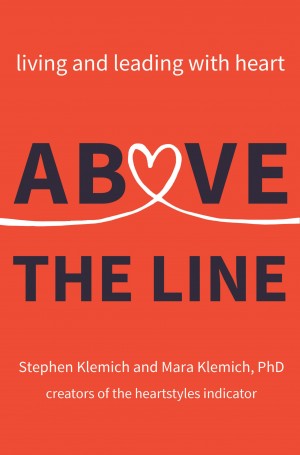You Might Think These 8 Behaviors Get You Ahead at Work — But They Are Actually Holding You Back

How often have you felt pressured to behave in ways you’re uncomfortable with but feel are necessary to fit in or get ahead in a corporate environment?
In our research (analyzing more than 100,000 responses), we have identified four kinds of self-protecting behavior (approval-seeking, easily offended, dependent, avoiding) and four kinds of self-promoting behavior (sarcastic, competitive, controlling, striving) that contribute to ineffective culture. We call these “below-the-line” behaviors.
These eight behaviors often seem to drive results at first, and many of us have used them to play the political game and get ahead. Eventually, however, these behaviors take their toll, leaving people disengaged, cynical, and ready to walk away from corporate life entirely.
Additionally, according to our research, people who use these behaviors more regularly are perceived as being low to moderate in terms of work effectiveness. This seems to suggest that, although these behaviors may have worked to some degree in the past, they are holding us back from the future.
Understanding Below-the-Line Behaviors
It helps to realize that most ineffective behaviors are born out of good intentions overridden by self-limiting fear or ego-driven pride.

Easily offended behavior stems from taking others’ remarks or feedback too personally. We see others’ comments as a personal attack and become overly sensitive, so people start walking on eggshells around us and stop giving us any feedback at all.
Dependent behavior means we don’t have the courage or confidence to trust our own opinions or perceptions. We let others make decisions, follow their directions, and don’t speak up.
Avoiding behavior stems from the good intention of not offending or upsetting others, but fear of rejection keeps us from dealing with conflict or taking risks. Avoiding behavior can keep us from holding ourselves accountable or being authentic with ourselves and others. We end up creating artificial harmony.
The good intention behind self-promoting sarcastic behavior is often an attempt to build relationships with others — but if we don’t have a strong enough sense of authenticity to be sincere, we revert to cynicism, sarcasm, and quick-witted comments to relate to others.
Competitive behavior is based in a good intention of wanting to be the best we can be, but it can lead to constantly comparing ourselves to others. It can push us to exaggerate, manipulate, and even cheat.
Controlling behavior means we become deeply attached to outcomes and what we think those outcomes will prove about us. We become focused on ensuring everything goes according to our plans and tasks are completed our way on our timelines. We may get results, but stress levels and antagonism will run high.
Striving, or perfectionism, overrides the good intention to achieve excellence. Instead, we become focused on avoiding all mistakes — and thus any chance of rejection. The resulting perfectionism can lead us to become workaholics, to be overly critical of ourselves and others, and to suffer from thoughts of never being good enough.
Adopting Above-the-Line Behaviors
Organizations that want to create high-performing cultures are searching for talented people who use less of these below-the-line behaviors. Instead, they want people who use “above-the-line” behaviors: authentic, achieving, relating, encouraging, developing others, and being compassionate.
Our research shows that the more authentic we are, the more effective we are seen to be by others and the less anxiety we have about ourselves. Living through our own authenticity allows us to create safe places for others to do the same. It frees us to achieve our personal best rather than being caught up in comparing ourselves to others or competing to get ahead. Living in our authenticity allows us to build genuine relationships with others, who will then allow us to coach and develop them because they know we have their best interests at heart.
Living and leading above the line improves work effectiveness, quality of relationships, time-management effectiveness, and stress levels. (Yes, we’ve researched the correlations for all this, too!) With authenticity, we live from significance (our inner worth and value) rather than for significance (seeking our worth from our external environments).
For more expert HR insights, check out the latest issue of Recruiter.com Magazine:
Get Above the Line With the SB+TB Formula
In 2020, when you catch yourself using below-the-line behaviors, ask yourself what they could be costing you: Are they depleting your energy, causing stress and anxiety, or inflicting problems in your relationships? Are you comparing yourself to others and losing heart for your work and life?
Make a commitment to yourself to live and lead above the line. You can get started by using what we call the “SB+TB formula”:
1. Stop and Breathe
When you stop and breathe, you create space to shift your energy, calm your anxiety, and think differently. Interestingly, when we are under stress, the fight-or-flight center of the brain activates, and we can’t really think logically or objectively. By stopping, breathing, and slowing our pulse down, we can cut through the fog and think more clearly. Try it — it works!
2. Think and Behave
With a clearer mind, you can start to think above the line and behave accordingly. Ask yourself: How can I take an opportunity to be authentic in my responses today? Make a choice to trade up from a below-the-line behavior to an above-the-line one instead. Keep that up, and you will start to live and lead above the line almost automatically.
Start with yourself, and you can help others on the road to becoming the best versions of themselves, too!
Stephen and Dr. Mara Klemich are the founders of the Heartstyles Indicator and authors ofAbove the Line: Living and Leading With Heart .

